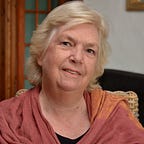When your cousin phones and says he’s been told you’re the ‘go to’ person for our family’s history, you sit up straight, and say, ‘Not the only one, Pam has a lot of information, too.’
There’s this silence, which you fill by saying, ‘What are you looking for?’
And he says his daughter has expressed an interest in ‘finding out more’, and because this is the second time in a year that she’d asked, he thought he should follow up.
You do a quick think, wondering what a thirty-something might be interested in, and what she might like to know.
Your cousin adds, ‘It’s taken me a long time to get her to read basic fiction. She doesn’t like history that much.’
That startles you. You’re a writer, and a prolific reader.
You stutter, ‘My work is a narrative. It runs to more than seventy pages — nearly thirty-thousand words.’ She won’t want to be bothered with that.
You stutter out that you’d put it to one side to concentrate on the one nearly finished, about the other side of your family.
Your cousin says, ‘My neighbour is an editor,’ and you reply that you’d spoken to her before, and she’d been most helpful. You didn’t point out that it had cost you a few hundred dollars to get her input. My cousin wouldn’t be interested in helping pay for more work.
Throughout the conversation he manages to observe he also knows another family historian who has done something brilliant, and a playwright who goes away for weekends at a time to concentrate on his work.
You comment, ‘I need a wife, and no horses, no dogs, no chooks, no garden.’
He wants information from me. Our conversation is going awry.
You say, ‘I am not ready to publish yet, because it needs work on the photos.’
Trunks and cases, and boxes, and folders, of disorderly photos, albums, negatives, films, yet to be sorted. Until then, they are all important. You know the photos you want are there, but where?
You tell your cousin you’ll have a look at the narrative, and get it into a form that his daughter might find interesting. You admit you don’t want her to try to ‘reinvent the wheel’ when you have already done the hard work. But you don’t want to admit that you are uncomfortable with a family member taking your hard-fought work and doing something else with it. Not until it’s properly published.
So, you email him a copy of the extracted genealogy — a list — of your grandfather’s family, and his great-grandfather’s family, and your grandmother’s ancestral chart.
Then you start to savage your careful work. You slash and burn, deleting, rewriting in places, and cutting the 70-odd pages down to 24. Twenty-eight thousand words are reduced to twelve thousand in a matter of hours.
You’ll go through it once more, to slash it by half again. It will still be interesting, but not as interesting as the original, because you’ve cut out the best bits.
And in the process of rewriting, you realise that your work is all but finished. You realise you have two family histories that are all but finished, and that what you’ve written is interesting, and well-constructed.
Maybe your cousin’s call wasn’t such a bad thing.
